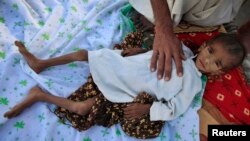Pakistan is the first country in the world to introduce a new vaccine into its routine immunization program for children to try to contain an ongoing "extensively drug-resistant (XDR)" outbreak of typhoid.
The outbreak, which hit Pakistan in 2016, has infected more than 10,000 people, mostly in the southern Sindh province. At risk of spreading internationally, it is caused by a so-called "superbug" bacterial strain that has evolved extensively to become drug-resistant.
"In 2017, 63% of typhoid cases and 70% of typhoid deaths in Pakistan were among children younger than 15 years of age," noted Friday's official announcement made in connection with vaccination drive.
With funding support from Geneva-based GAVI vaccine alliance, Pakistani officials said Friday, the two-week campaign began in urban areas of Sindh, targeting 10 million children between 9 months and 15 years old.
The typhoid conjugate vaccine (TCV), recommended by the World Health Organization (WHO), is the first vaccine that can be given to children as young as six months and confers longer-term protection against the fever, the officials said.
"Children are disproportionately affected by typhoid and its associated complications, and we strongly believe that TCV would protect our children against potentially fatal disease of typhoid," said Dr. Zafar Mirza, adviser to the Pakistani Prime Minister on health.
The new vaccine has been successfully and safely used as part of the outbreak response in Sindh since April 2019. It will be deployed throughout the rest of Pakistan by 2021, according to the statement.
Infections
Typhoid, a serious illness caused by Salmonella Typhi, spreads through contaminated food and water, and it disproportionately affects children and low-resource communities in Asia and sub-Saharan Africa.
The Global Burden of Disease study estimates that in 2017, there were nearly 11 million typhoid cases and more than 116,000 typhoid deaths worldwide.
Infections reportedly already have been spread in travelers to Pakistan from countries such as the United States, Australia, Britain, Canada, Denmark and Taiwan.
The bacterial strain causes fever, nausea, stomach pain and pink spots on the chest. In severe cases, experts say, the disease can lead to complications in the gut and head that can be fatal. It is resistant to all but one oral antibiotic for typhoid, making it increasingly challenging and costly to treat.
Treatment
Before the discovery of antibiotics, typhoid would kill as many as one in five people who contracted it, the statement quoted Dr. Seth Berkley of the GAVI alliance as saying.
"The rise of extreme drug-resistant typhoid risks bringing us back to levels of mortality not seen since the 19th century, posing a risk to all of us," Berkley warned.
He underscored the importance of the vaccine and praised Pakistan for being the first to introduce the "lifesaver" into its routine immunization program.




